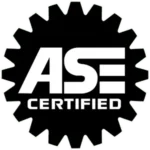
Radiator & Cooling System Experts
Prevent overheating with professional radiator repair and cooling diagnostics.
at Kwik Kar in Texas
Your vehicle’s cooling system plays a crucial role in preventing engine damage, and at the heart of that system is your radiator. At Kwik Kar Automotive Lube & Services, we specialize in radiator repair, coolant leak detection, and complete cooling system diagnostics to help Texas drivers stay safely on the road. Experiencing engine overheating or coolant loss? Visit a Kwik Kar location in Texas today.
Signs Your Cooling System Needs Service
If you’re experiencing any of the following symptoms, it’s time to have your cooling system inspected:
- Engine overheating (temperature gauge rising or warning lights)
- Check engine light triggered by temperature sensors
- Coolant leaks or puddles under your vehicle
- Low coolant levels or frequent coolant top-offs
- White exhaust smoke, indicating a possible head gasket leak
Don’t wait—cooling system failure can cause severe engine damage in under 60 seconds.
Common Radiator & Cooling System Problems
Overheating
Without proper heat management, overheating can warp heads, expand pistons, and destroy internal components.
Coolant Leaks
Leaks from hoses, radiators, or gaskets reduce coolant volume and can contaminate engine oil, leading to internal corrosion.
Poor Lubrication
Overheating can break down oil, reducing engine lubrication and increasing wear.
Inspections
Excess heat can create hardened deposits in the engine, blocking coolant flow and further reducing cooling efficiency.
What Does a Radiator Do?
Your radiator acts as a heat exchanger, drawing excess heat from the engine and releasing it into the surrounding air. As hot coolant flows from the engine to the radiator, thin metal fins disperse that heat, cooling the liquid before it circulates back to absorb more. A failing radiator or leak in the system can quickly lead to engine overheating, loss of performance, or even permanent engine damage.
Kwik Kar Cooling System Services
Our certified technicians perform:
- Radiator repairs and replacement
- Coolant flush and refill
- Leak detection and hose inspection
- Thermostat, water pump, and fan diagnostics
- Head gasket evaluations (if white smoke is present)
We service all makes and models, using OEM-grade parts and advanced diagnostics to catch issues early and prevent major repairs.
Find a Kwik Kar location near you—proudly serving honest auto care in Austin, Houston and Dallas/Fort Worth areas


Why Choose Kwik Kar for Radiator Repair?
We take every step to ensure your vehicle gets the care it deserves. We’ll keep your engine cool—no matter how hot Texas gets.
- Experienced mechanics & quality parts
- Fast turnaround—no long waits
- 16 convenient Texas locations
- Honest diagnostics and clear recommendations

FIND YOUR LOCAL
KWIK KAR
- Austin
- Dallas / Fort Worth
- Houston
Text of the printin a galley of type and bled it to a type specimen book. It has survived not only five centuries make Lorem Ipsum is simply dummy.

Felica Queen
| Auto DealerA galley of type and bled it to make a type specimen book. Ipsum is simply dummy text of the printin It has survived not only five centuries.

Michael Bean
| Car DealerIt has survived not only five centuries. lorem Ipsum is simply dummy text of the printin a galley of type and bled it to make a type specimen book.

Alice Williams
| Auto DealerPrintin a galley of type and bled It has survived not lorem Ipsum is simply dummy text of the it to make a type specimen book only five centuries.

Sara Lisbon
| CustomerFAQs about Radiator & Cooling System Repair
Is engine and radiator coolant the same thing?
Coolant and antifreeze are often confused as being two different chemicals. However, the truth is, they are the same thing! At the end of the day, coolant is just straight antifreeze mixed with distilled water in a 50/50 blend.
What causes a car to overheat?
– A low coolant level causes the engine to overheat since there is insufficient liquid to carry heat away from the engine.
– A faulty thermostat that doesn’t open to circulate coolant will lead to overheating as heat builds up in the engine.
– Clogged radiators or a damaged cooling fan prevent air from adequately flowing across radiator fins to cool the coolant, resulting in overheating.
– A failed water pump cannot properly pump coolant through the engine, failing to transfer heat away from the engine and leading to overheating issues.
– Leaks, cracks, or blockages in coolant hoses and passages prevent the coolant from fully circulating and cooling the engine.
– Engine issues like seized pistons, bad head gaskets, or excessive friction create excessive heat that typical coolant systems cannot properly dissipate quickly enough.
How do I know if my radiator is broken?
The signs that your radiator has a problem are easy to spot. Some of the most common signs that your radiator is broken can be a constantly overheating engine, leaking coolant, a sweet smell coming from your engine, your heater failing to work, and orange or brown coolant.
How much does it cost to replace a radiator in a car?
Replacing a radiator for most modern cars costs owners between $400 and $1,000. Make an appointment today!





